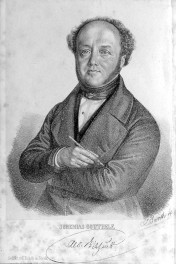Albert Bitzius: Life and Works
Jeremias Gotthelf (1797–1854)
Jeremias Gotthelf`s life and work were infused with liberal ideals, which made their entries into the Bernese Constitution in 1831. Their promise, the sovereignty of a mature people and the social responsibility allotted to all levels of society within the framework of a Christian social ethics, was held by Gotthelf all his life in alignment with his self-image as a Christian republican. His liberal zeal for reform was documented not only in his political newspaper articles and almanac publications, but also in his early novels “Der Bauern-Spiegel” and “Leiden und Freuden eines Schulmeisters”. Gotthelf`s satirical talents were triggered, similarly to Heinrich Heine`s, by incompetent regents and officials.
Gotthelf also progressively became a critic of Switzerland`s developments on her route to becoming a federal state. He distanced himself from a radical policy – the redistribution of property and high public social expenses – because he was deeply disturbed by statements of radicals hostile to the church as well as fomenting antagonism towards conservative-catholic cantons. His caricature of a policy obsessed with progress without a moral compass discredited the pastor of Lützelflüh in the eyes of Bernese readers. The German reading audience, however, precisely valued his depiction of the rural world, as they saw it contrasting more and more with the Industrial Age.
Today, Gotthelf`s Entwicklungsromane (novels of character development) and Familiengeschichten (generational novels) fascinate just as reflections of threatened idylls. Drastic character-drawings, political scolding, and profound socio-psychological portraits outline the typical realism of his Zeitromane (social novels), for which reason his work drew admiration from Gottfried Keller. Gotthelf`s historical novellas, one the other hand, are marked rather by the sophisticated narrative art of late romanticism. In these, he projected contemporary conflicts with fantastic imagery and apocalyptic commentaries onto an apparently primordial Switzerland of the medieval age.

